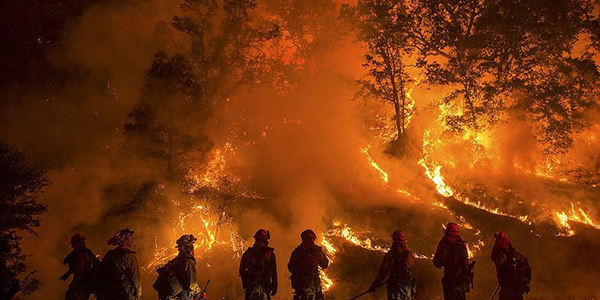Pacific Gas and Electric told the federal judge overseeing its felony probation that a distribution line under investigation for starting the deadly Zogg Fire on Sept. 27 remained active even as other circuits in the same region were de-energized during a large-scale public-safety power shutoff.
In a court filing Monday, PG&E responded to an inquiry by U.S. District Court Judge William Alsup about the utility’s possible role in starting the Zogg Fire in Shasta and Tehama counties. The fire killed four people, including a mother and her 8-year-old daughter, destroyed 204 structures and burned more than 56,000 acres before being brought under control.
The California Department of Forestry and Fire Protection (Cal Fire) seized a portion of PG&E’s Girvan 1101 12-kV circuit, near the rural community of Igo, where the fire began, PG&E told the California Public Utilities Commission (CPUC) in an Oct. 9 incident report. (See PG&E Under Scrutiny in Deadly Zogg Fire.)
Alsup asked PG&E to explain why the Girvan Circuit hadn’t been de-energized, and who made that decision, during the Sept. 27-29 public-safety power shutoffs (PSPS) that blacked out more than 64,000 customers in 15 counties in Northern California.
“The Girvan Circuit was energized because PG&E’s PSPS models, developed well before the Zogg Fire, did not identify that circuit for potential de-energization based on the facts and weather predictions available for the September 27, 2020, PSPS event,” the utility told Alsup.
“Circuits not identified for inclusion in the scope of a potential PSPS event remain energized and are not subject to any decision during the event to leave the circuit energized,” PG&E said. “Accordingly, there was no ‘decision to leave [the line] energized.’”
The utility said it experienced a series of drops in voltage on the Girvan Circuit on the afternoon the Zogg Fire started. But the problems weren’t enough to cause a line “recloser to open or ‘trip,’ resulting in de-energization of the line it protects,” prior to the fire’s start.
The line de-energized only after a wildfire camera and satellites photographed smoke, apparently from the fire, the utility said.
PG&E told Alsup it did not yet know if its equipment started the fire.
“PG&E recognizes the devastation caused by the Zogg Fire, which resulted in the loss of four lives and destroyed many homes,” it said. “Like the court, PG&E is actively seeking to understand the cause of the fire and the role, if any, of PG&E’s facilities.”
Alsup has been an outspoken PG&E critic during his years overseeing the utility’s probation on felony convictions related to the San Bruno gas pipeline explosion in September 2010.
PG&E noted in its filing that during the five days Alsup gave it to respond to his Oct. 21 order, it had been engaged in a massive PSPS event due to the driest and windiest conditions of the year and that “relevant PG&E personnel who may have otherwise provided input” were unavailable.
PG&E shut off power to 361,000 customers, or more than 1 million residents, in portions of 36 counties on Sunday and Monday as powerful Diablo winds swept through the Sierra Nevada foothills and the coastal mountains north of San Francisco, where PG&E equipment started major fires in 2017, 2018 and 2019.
During this week’s wind events, numerous small fires started in Northern California but were largely under control as of Tuesday, Cal Fire reported. Santa Ana winds rapidly spread two major fires in Southern California, the Silverado and Blue Ridge, the causes of which remain under investigation.




